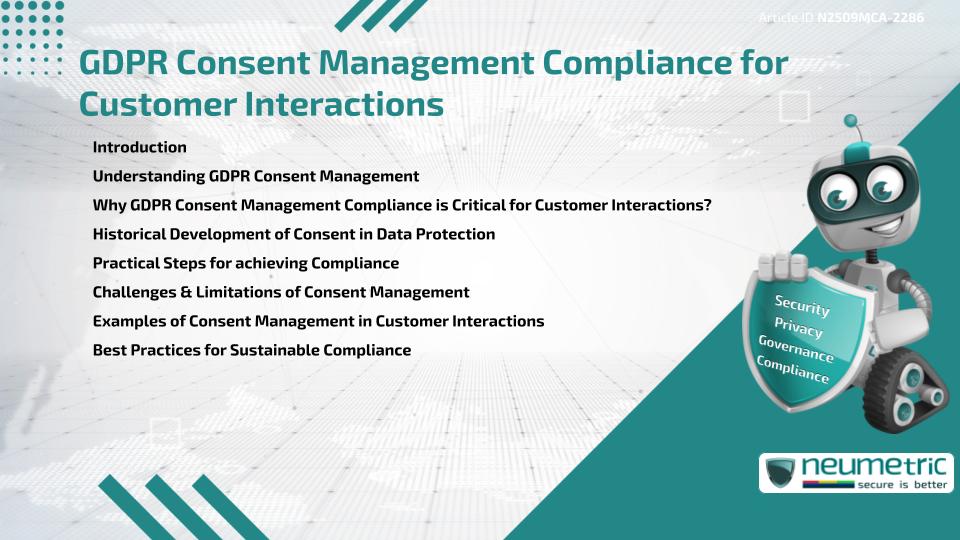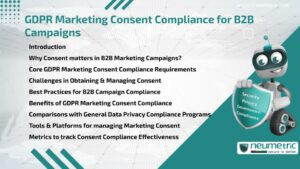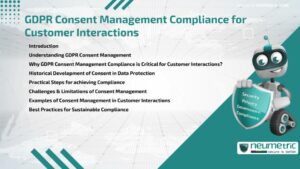Table of Contents
ToggleIntroduction
The General Data Protection Regulation [GDPR] reshaped how Organisations handle Customer Data by placing strict requirements on obtaining, storing & managing Consent. For enterprises, GDPR Consent Management Compliance ensures that Customer interactions remain transparent, lawful & respectful of individual rights. This principle not only helps avoid Penalties but also fosters Trust & strengthens Customer relationships. In this article, we examine the concept of Consent Management, its history, Compliance steps, challenges & Best Practices for effective implementation.
Understanding GDPR Consent Management
Consent under GDPR must be freely given, specific, informed & unambiguous. Customers must actively agree to data collection or processing & Organisations cannot rely on silence or pre-ticked boxes. Consent management refers to the systems & processes that capture, track & manage Customer choices across digital & offline channels.
In practice, this includes cookie banners, subscription forms & preference centers. These tools should empower Customers to grant or withdraw Consent at any time, ensuring that enterprises respect their rights.
Why GDPR Consent Management Compliance is Critical for Customer Interactions?
Consent is often the Legal foundation for processing Customer Data in marketing, analytics & personalisation. Without proper Consent Management, enterprises Risk significant fines of up to four percent (4%) of annual turnover. More importantly, Customers are increasingly aware of their rights & expect clear choices. Proper Compliance enhances Customer confidence & enables enterprises to build long-term loyalty.
Historical Development of Consent in Data Protection
Consent as a concept has long existed in Data Protection frameworks. The EU Data Protection Directive of 1995 required Organisations to seek Consent but lacked specific criteria. GDPR, which took effect in 2018, established stricter standards by requiring explicit action & easy withdrawal. This shift was driven by the rise of digital platforms, targeted advertising & the need to give individuals greater control over their Personal Information.
Practical Steps for achieving Compliance
To achieve GDPR Consent Management Compliance, Organisations should adopt a structured approach:
- Design clear Consent requests with plain language & no ambiguity.
- Implement Consent Management platforms that log when, how & why Consent was obtained.
- Provide granular choices so Customers can agree to some activities while rejecting others.
- Allow simple withdrawal of Consent through accessible tools or links.
- Regularly Audit Consent records to ensure ongoing Compliance & Transparency.
Challenges & Limitations of Consent Management
Consent management is not without difficulties. Enterprises often struggle to design interfaces that are both user-friendly & compliant. Overly complex or frequent Consent requests may frustrate Customers, leading to disengagement. Additionally, managing Consent across multiple systems & jurisdictions requires significant resources & coordination. Some critics argue that over-reliance on Consent shifts the burden onto individuals rather than addressing broader structural issues.
Examples of Consent Management in Customer Interactions
Several practical examples highlight Compliance in action:
- E-commerce sites using cookie banners that allow Customers to accept or reject specific tracking categories.
- Email marketing systems require explicit opt-in before sending promotional content.
- Mobile Apps prompting users to enable location sharing only when necessary.
These examples demonstrate how Consent Management tools can create a balance between Business Needs & Customer rights.
Best Practices for Sustainable Compliance
For long-term success, enterprises should:
- Integrate Consent Management into overall Customer relationship strategies.
- Train Employees to understand the Legal & practical aspects of Consent.
- Use centralised platforms to track Consent across different departments & systems.
- Communicate clearly with Customers about how their data is used & respected.
These practices help build a culture of Compliance while strengthening Customer Trust.
Takeaways
- Consent must be explicit, informed & easy to withdraw.
- GDPR Consent Management Compliance helps avoid fines & enhances Customer Trust.
- Organisations should use platforms & processes to log, track & manage Consent.
- Challenges include balancing usability with strict legal requirements.
- Best Practices involve integration, training & clear communication.
FAQ
What is Consent Management under GDPR?
Consent management refers to the systems & processes Organisations use to obtain, store & track Customer Consent in Compliance with GDPR.
Why is GDPR Consent Management Compliance important?
It ensures lawful processing of Customer Data, reduces Regulatory Risks & builds stronger Trust with Customers.
Can Organisations use pre-ticked boxes for Consent?
No, GDPR prohibits pre-ticked boxes. Consent must be given through a clear affirmative action.
How can Customers withdraw Consent?
Customers must be able to withdraw Consent as easily as they gave it, usually through account settings, unsubscribe links or preference centers.
Do all Customer interactions require Consent?
No, Consent is only required when no other Legal basis for processing applies, such as legal obligations or contractual necessity.
What tools help manage Consent?
Consent management platforms [CMPs] help Organisations capture, store & synchronise Customer Consent across digital channels.
Is Consent Management only relevant for online interactions?
No, it also applies offline, such as when collecting data through physical forms or in-person signups.
Need help for Security, Privacy, Governance & VAPT?
Neumetric provides organisations the necessary help to achieve their Cybersecurity, Compliance, Governance, Privacy, Certifications & Pentesting needs.
Organisations & Businesses, specifically those which provide SaaS & AI Solutions in the Fintech, BFSI & other regulated sectors, usually need a Cybersecurity Partner for meeting & maintaining the ongoing Security & Privacy needs & requirements of their Enterprise Clients & Privacy conscious Customers.
SOC 2, ISO 27001, ISO 42001, NIST, HIPAA, HECVAT, EU GDPR are some of the Frameworks that are served by Fusion – a SaaS, multimodular, multitenant, centralised, automated, Cybersecurity & Compliance Management system.
Neumetric also provides Expert Services for technical security which covers VAPT for Web Applications, APIs, iOS & Android Mobile Apps, Security Testing for AWS & other Cloud Environments & Cloud Infrastructure & other similar scopes.
Reach out to us by Email or filling out the Contact Form…





